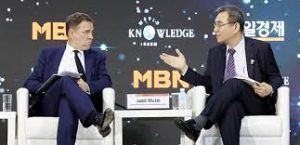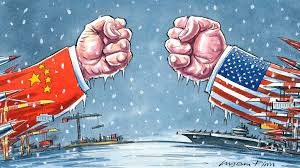Last week I had the pleasure to speak on behalf of IESE Business School at the World Knowledge Forum in Seoul which has been running for the last 20 years and brings speakers from all over the world.
 The opening panel of the three day event featured Niall Ferguson, who is one of my favourite historians, as well as Justin Yifu Lin a Chinese economist from Peking University. The panel was supposed to be about the economic trade tensions between the United States and China but Professor Ferguson quickly moved the conversation to tense debate about the future of the world much to the dismay of CNN’s Christie Lu Stout, who tried to moderate the discussion.
The opening panel of the three day event featured Niall Ferguson, who is one of my favourite historians, as well as Justin Yifu Lin a Chinese economist from Peking University. The panel was supposed to be about the economic trade tensions between the United States and China but Professor Ferguson quickly moved the conversation to tense debate about the future of the world much to the dismay of CNN’s Christie Lu Stout, who tried to moderate the discussion.
While it seemed clear that Ferguson does not fully endorse Donald Trump, he did think that the current trade dispute was a step in the right direction even if he felt the United dates should go even further to limit China’s role in the region and the world. I will summarize his points below due to the respect I hold for Professor Ferguson as an historian although I am not fully on board with his thesis. For a list of his books, all of which I recommend, click here.
 In Ferguson’s view the current trade dispute is not really about trade but is the beginning of what he called Cold War 2.0 or a conflict between the United States and China. This conflict will be different than the 70 year struggle between the U.S. and the former Soviet Union as it will not necessarily focus on military forces but instead have to do with economic and information security.
In Ferguson’s view the current trade dispute is not really about trade but is the beginning of what he called Cold War 2.0 or a conflict between the United States and China. This conflict will be different than the 70 year struggle between the U.S. and the former Soviet Union as it will not necessarily focus on military forces but instead have to do with economic and information security.
He believes that the West has been naive in its support of China’s modernization and economic progress and that if China is not brought under control it, and its totalitarian system, will engulf the democracies of the region and perhaps the world.
For Ferguson China owes its economic progress to its stealing intellectual property; practicing large scale industrial espionage; bending, if not breaking, WTO rules; manipulating its currency; excluding international competitors from its markets through non tariff barriers; and provoking a global climate crisis.
In this context, the move by the Trump administration to end China’s free ride is overdue and needs to go further.
Ferguson glossed over South Korea’s own defence of its large Chaebol companies in its economic rise and praised the country and its people for its transition to fully democratic government and commitment to human freedom as well as economic progress.
The error he thinks that the West made was to assume that China would undergo a similar transition as it developed its economy but that the communist party is firmly in control of the country and has, in fact, placed its 1.2 billion citizens under surveillance in a reality that echoes the dystopian futures seen in Aldous Huxley’s Brave New World.
 He felt that the countries of the region would have to choose between China and the U.S. but he felt that the choice was an obvious one. He believes that China plans to extend its totalitarian system to others as it is doing in Hong Kong despite its public commitment to not interfere with the choices of other nations.
He felt that the countries of the region would have to choose between China and the U.S. but he felt that the choice was an obvious one. He believes that China plans to extend its totalitarian system to others as it is doing in Hong Kong despite its public commitment to not interfere with the choices of other nations.
It seemed to me that Yifu Lin, the Chinese economist, was totally unprepared for the substance and tone of Ferguson’s remarks although he tried to defend his country and its right to its own system of government and economic planning.
Over the weekend there were two stories concerning Donald Trump’s administration. One had to do with the start of impeachment proceedings and another on a possible move to prohibit Chinese companies from listing on U.S. stock exchanges.
Since my understanding is that President Xi will not back down in the current spat with the United States, the economic cold war will become a reality unless Trump makes some major concession to China and calls it a success.

